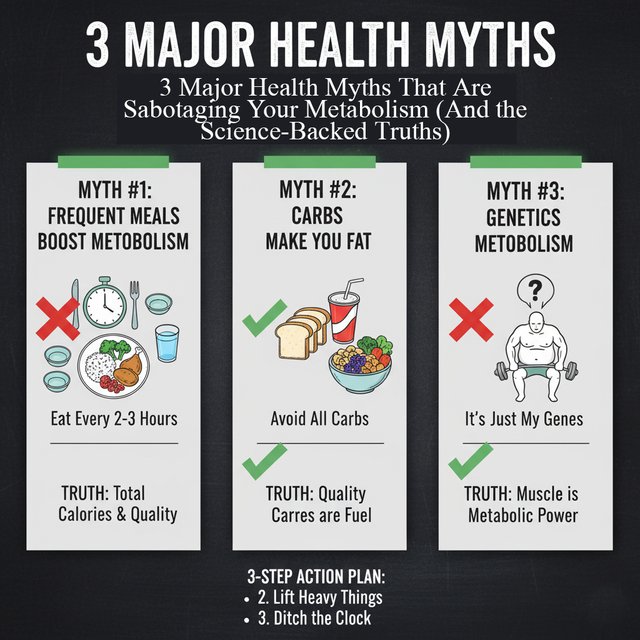3 Major Health Myths That Are Sabotaging Your Metabolism (And the Science-Backed Truths)

The internet is flooded with diet and fitness advice, but when it comes to your metabolism—the engine that turns food into fuel—a lot of that information is flat-out wrong. Following these common myths can actually make it harder for you to reach your health goals.
It's time to stop fighting your body and start working with it. Let's debunk three major myths and replace them with the science-backed truths that will genuinely boost your metabolic health.
Myth #1: Eating Small, Frequent Meals “Boosts” Your Metabolism
This is one of the oldest and most persistent pieces of diet advice: you need to eat every 2-3 hours to "keep the furnace burning."
❌ The Myth: Eating constantly keeps your metabolism in a perpetually high state, and skipping meals sends you into "starvation mode."
The Science-Backed Truth: Total Calories & Food Quality Matter More
Your body does expend energy to digest food—this is called the Thermic Effect of Food (TEF). But here’s the key: the total amount of energy spent on TEF is proportional to the total number of calories and protein you eat in a day, regardless of how many meals you split them into.
A study comparing 3 large meals vs. 6 small meals found no significant difference in total calories burned over a 24-hour period.
"Starvation mode" is mostly a myth unless you are in a severe, prolonged calorie deficit (think eating under 1,000 calories a day). For most people, simply skipping breakfast will not cause your metabolism to shut down.
✅ The Metabolic Takeaway:
Focus less on the clock and more on quality and overall calorie balance. If eating 3 meals helps you control portions and eat fewer overall calories, stick to that! If you prefer 5 small meals, that's fine too. Choose the meal frequency that best supports your schedule and hunger levels.
Myth #2: Carbs are the Enemy and Automatically Slow Your Metabolism
Thanks to the popularity of various low-carb diets, many people view all carbohydrates as "fat-storing" villains that cripple metabolic function.
❌ The Myth: Carbs (especially after a certain time of day) are converted directly to fat because they spike insulin, which then slows down your metabolism and prevents fat burning.
The Science-Backed Truth: Carbs are Essential Fuel (You Just Need the Right Ones)
Your body uses carbohydrates as its primary and preferred source of energy, especially for your brain and during high-intensity exercise.
Weight Gain is a Calorie Problem, Not a Carb Problem: Numerous studies have shown that when calories and protein intake are matched, low-carb and high-carb diets result in similar fat loss. Weight gain happens when you consistently consume more calories than you burn, regardless of whether they come from carbs, fats, or protein.
The Difference is Quality: Complex, high-fiber carbs (like whole grains, vegetables, and legumes) are digested slowly, providing steady energy, promoting gut health, and stabilizing blood sugar. Highly processed, simple carbs (like sugary sodas and white bread) are the ones to limit, as they provide empty calories and rapid blood sugar spikes.
✅ The Metabolic Takeaway:
Don't eliminate carbs. Focus on choosing high-fiber, complex sources and pairing them with protein or healthy fats. This pairing helps slow digestion and moderates the blood sugar response, allowing your body to use that energy efficiently without the crash.
Myth #3: Your Metabolism is Purely Genetic and You Can’t Change It
Many people resignedly blame their genetics for a "slow metabolism" and believe there’s nothing they can do to speed it up.
❌ The Myth: You were born with a slow metabolism, and that’s just your fate.
The Science-Backed Truth: Muscle Mass is Your Metabolic Superpower
While genetics certainly play a role in your Basal Metabolic Rate (BMR), you have significant control over the most powerful part of your metabolic engine: your lean muscle mass.
Muscle is Metabolically Active: One pound of muscle burns significantly more calories at rest than one pound of fat. Therefore, building and maintaining muscle tissue is the single most effective, long-term way to naturally elevate your resting metabolism.
The Decline is Preventable: Metabolism naturally slows down as we age, but this is largely due to the loss of muscle mass (sarcopenia) that occurs with inactivity, not age itself. You can counteract this decline with specific lifestyle changes.
✅ The Metabolic Takeaway:
Make Strength Training (lifting weights, resistance bands, bodyweight exercises) a non-negotiable part of your routine. This will help you build metabolically-active tissue that burns more calories 24/7, even while you sleep, giving you a powerful, permanent metabolic boost that genetics can't stop.
Your 3-Step Action Plan for a Faster Metabolism:
Prioritize Protein: Protein has the highest Thermic Effect of Food (TEF). Aim to include a source of lean protein (chicken, fish, legumes, eggs) in every meal to maximize calorie burn from digestion.
Lift Heavy Things: Incorporate resistance training 2-3 times per week. The more muscle you build, the higher your resting metabolic rate will be.
Ditch the Clock: Stop worrying about when you eat, and focus 90% of your attention on what you eat (whole foods, lean protein, complex carbs) and your total daily calories.
What’s one metabolic myth you’ve heard or believed in the past? Share it in the comments below!